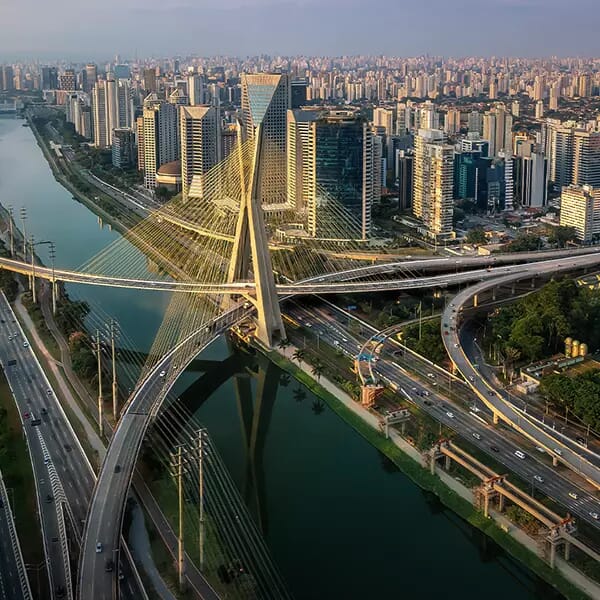 <label style="color:#fff;">Crédito: GRI Club<label>
<label style="color:#fff;">Crédito: GRI Club<label>Public and private sectors gather at Infra Mexico GRI 2019
3rd edition of the Infra Mexico GRI brought together over 70 key players building the country’s infrastructure sector.
The third edition of Infra Mexico GRI was held on September 25 and 26, in Mexico City, gathering over 70 key decision-makers from both the public and private sectors. This meeting was an opportunity to discuss investment perspectives for the infrastructure sector, as well as the current and future challenges in Mexico’s energy, transport, and telecommunications sectors.
During the two days, the conference enabled the exchange of knowledge and key opinions of the market, in an informal and intimate environment through sessions that promoted discussion and the development of fruitful commercial relationships. Important players from investment funds, project finance, sponsors, banks, state governments and federal agencies were present at the meeting.
Various government representatives attended the session, such as Sergio Forte, deputy general director of Banobras; Rogelio Jiménez Pons, general director of the National Fund for Tourism Promotion (Fonatur); Luis Bruno Moreno, head of the Technical Management Unit of the National Center for Natural Gas Control (Cenagas); David Zamora, secretary of Infrastructure and Public Works of the State of Jalisco; and María de Lourdes Coss, general director of Telecommunications Investment Promotion Agency (Promtel). Together with strategic private sector players, they discussed important topics to boost the country’s infrastructure competitiveness.
The conference was attended by executives such as Alonso García Tamés (CDPQ Capital México); Ignacio García (Sacyr); Camilo Serrano (Atlas Renewable Energy); Carlos Redondo Rincón (Roadis), Emilio Uquillas (CAF), Fabrice Boucheteil (Suez), Pascal Lemonnier (Egis); Julian Torrado (CIBC), Miguel Luis Anaya (Pensionissste); José Carassó (ING); Manuel Rodríguez Arregui (Ainda Energy & Infrastructure); José María Zertuche (BlackRock Real Assets); Laurie Fitzmaurice (EDF Renewables); Sophie Brossard (BNP Paribas); and Udi Margulies (Scotiabank).
Infra Mexico GRI 2019’s keynote presentation was given by Carlos Morales, director of Sovereign Funds at Fitch Ratings, where he discussed Fitch’s sovereign rating for Mexico. Morales detailed the agency’s reasoning for downgrading its rating, which was influenced by fiscal pressures, slow economic growth, inadequate progress in structural reforms, contingent liability risks and the perception of corruption in the country. Nevertheless, he also highlighted positive factors such as a stable outlook for inflation and the establishment of prudent fiscal policies in Mexico.
During the meeting, strategic issues such as regional growth were discussed, with a special highlight of the Mayan Train project and the development opportunities that will derive from it. Participants also talked about the expansion of the country’s telecommunications network and shared their perceptions about the main challenges, as well as the strategic actions to be taken to consolidate the network’s expansion objectives.
Furthermore, there was a discussion on investment prospects in energy generation and transmission, which included the suspension and possible return of the long-term electricity auctions. The attendees agreed that the messages given by the Mexican authorities in different forums play a primordial role in rebuilding confidence among the private sector.
Mexico’s willingness to adopt international standards in terms of compliance and anti-corruption in the sector was also brought into discussion. In that regard, the executives emphasized their perception of a weak coordination between the branches of government, areas of opportunity to strengthen regulatory bodies and challenges existing at the municipal level.
Assistants also talked about the importance of reviewing best practices and lessons learned from Public-Private Partnerships (PPPs) to create new structures, such as the current risk distribution to find a better balance between all parties involved.
State’s showcase infrastructure agenda
The second day of Infra Mexico GRI began with a special session spotlighting the project portfolios of the state governments of Jalisco, Guanajuato and Querétaro. David Zamora Bueno, secretary of Infrastructure of Jalisco, shared the state’s plans to allocate budget to the development of infrastructure, with a special focus on education and health projects. This plan also includes the intervention of unfinished and rehabilitated projects. Additionally, Zamora presented investments in transportation projects to boost the country’s connectivity through the modernization and reconstruction of its road network.
Juan Alberto Ponce, head of the State Project Unit of the Ministry of Infrastructure, Connectivity and Mobility (Sicom), spoke about Guanajuato’s flagship projects including the Silao-San Miguel de Allende highway, the Northwest Leon Bypass concession, the Celaya Intermodal Terminal, the Metropolitan and Intermunicipal Train, as well as the opportunities offered by the market for electric power generation and natural gas projects.
When it comes to urban development, Alejandro Guerrero, from the Secretariat of Urban Development and Public Works of Queretaro, commented that the state’s priority is to boost its economic and social development. He shared projects that have high potential to interconnect the region, in particular the Guanajuato-Queretaro Intercity Train, the Mexico-Queretaro Interurban Train and the West and East Ring Roads. Guerrero also presented Queretaro’s plans to integrate private investment in basic infrastructure projects such as drinking water, drainage, sewage and public lighting.
After presenting the endless opportunities for development, all state representatives encouraged the private sector to join these efforts.
Transport and energy opportunities
Throughout the event, attendees also raised attention to transport infrastructure, specifically the Mexican road network. It was agreed that there is a need to detonate greenfield projects not only at the federal level, but also at the state level. The projects and investments planned under the initiative of the Transisthmian Corridor in the Isthmus of Tehuantepec, such as the Ports of Salinas Cruz and Coatzacoalcos, the Isthmus Railway and roads. Pipelines and the electrical system of the region were also included in the meeting agenda, for which the private initiative provided comments for its development and structure.
Finally, together with representatives of Cenagas, attendees had the opportunity to discuss the expansion of gas transportation infrastructure, especially regarding the recent agreements between the Federal Electricity Commission (CFE) and contractors to restart the construction of suspended pipelines.
Infra Mexico GRI cultivated a space for players to openly discuss key topics, generating a constructive dialogue between sectors to develop strategies and identify opportunities to bridge the country’s infrastructure gap. Both sectors agreed that citizen involvement and alignment of objectives throughout government branches will play a crucial role in consolidating the country's infrastructure plan.



